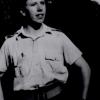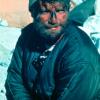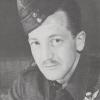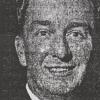In spite of having received 'an awfully nice letter' from Roberts, who wrote that they all missed him and wanted him back, Myles refused a proffered promotion and, although for security reasons was unable to tell me what he was up to, I sensed from the tone of his letters that some change was imminent. In one he mentioned that he felt so strongly that he had 'some unfinished business with Hitler' and in another that he needed a more forceful objective.
‘When I was at school I worked to pass an exam, at Cambridge it was the same, when I was a private I intended to become an officer, in England we trained for counter-invasion, in the desert we trained to push the Germans out of Egypt, but up here we have no purpose at all ... I feel I need in some little way to help to win the war more quickly than I am at present doing.’
His 'purpose' became abundantly clear in a letter written on June 11th, 1943:
‘You will see by the above address that I am in a Parachute Battalion and actually have been here two weeks, but did not want to tell you that until I had completed my qualifying jumps ... we are being presented with our wings and badge this morning ... I am not allowed to tell you how many jumps I have done, the planes we fly in or anything about the equipment, however I can tell you about my sensations. Let me first tell you ... that parachuting is definitely NOT dangerous; I am not pretending that I enjoy throwing myself out of a plane for I don't but it is not nearly as frightening as you might think, nor is it glamorous or tough as people make out, any more than infantry; in fact the only difference is we land by parachute instead of lorries. I reckon it is much safer than ground troops because we have the element of surprise which land troops do not. Anyhow as to my feelings and what we do. First of all we do some PT then go on some swings, (I am not allowed to go into any more details) go to the aerodrome, fix on our parachutes, enter the plane and take off The word 'Action Stations' comes and then 'GO' and out one pops like a cork, for the rushing air just whips one out. The next thing I remember is being pushed about by the wind and then a gentle tug on my shoulder and I realize my parachute has opened and I glide to the ground. The hardest part is landing on the ground. I will not pretend that I like the actual minute or two before I jump, but it is not that bad because we jump as a team and the esprit de corps in the squad I am in is quite amazing — the morale and spirit of the men is magnificent and the men feel that their officers are doing the same as them, for we, the officers, do not come down in armchairs and therefore the comradeship is much greater between officers and men than in any other body of men I have come across.
The first day of jumping they make a man do his first jump and as soon as he has landed he is shot into a lorry, sent down to the aerodrome, given another parachute and into another aeroplane and out again. In my case my two jumps were done within half an hour. I suppose to some people jumping is a drug for when a man has landed he is very virile indeed and capable of doing things that normally he can't do. People land on the ground in a very excited state, asking all sorts of mad questions! Something to do with the nervous tension I suppose ...
One thing that appeals to me (apart from the extra 2/-per day we get) is the very luxurious camp we live in. I share a room with three very charming people, have a table and chair which I pinched, electric light and placesto hang clothes. About 20 yards away are hot and cold showers ... and the men also live in great comfort. I have been deluged by letters from the Battalion asking how they can join the parachutists and I write a nice polite note to each one telling them I will do all I can.’
'The lady doth protest too much, methinks.' A Shakespearean quotation which, although totally inaccurate in gender, came wryly to mind in subsequent letters. They continued to emphasise the fact that parachuting was not dangerous. But why, we wondered, were they otherwise entitled to those extra shillings? To prove his point Myles gleefully related this tale of one private soldier, who when asked by his CO what he thought of parachuting replied, ‘ “Damn all in it, sir, just like my stomach!" For he had jumped before breakfast.'
These constant reiterations of safety and the advantages of parachuting over land fighting were partially due to the horrified reactions of family and friends back home.
Every man had volunteered for his own specific reasons, but due to secrecy, the vital decision had to be made alone, and several of these new airborne soldiers suffered from feelings of guilt towards their loved ones. A close friend of Myles's received such a 'raspberry' from his mother that it depressed him for days. Myles himself tore my heart strings by writing, 'am I a criminal to have become a member of a parachute battalion?' in refutation of accusations that by joining such a considered suicide unit his behaviour to me was little less than 'caddish'!
Despite assurances that he would somehow 'get out' if I truly wanted that, I knew I had no choice. I could only support him in whatever he himself considered right, vindicate his decision to seize every opportunity to destroy evil, unintelligent, racist Nazism, and silently admire his initiative and courage.
Soon he was flying all over the Middle East as a member of the selection board to recruit new parachutists.:
‘Lord knows what I should know about parachuting but apparently we visit each Division, choose those we want and throw out the rest? ... I had to take off my parachute wings in Cairo for I just can't stick it when people sort of look in amazement ...’
So typical of his innate modesty and dislike of ostentation. No mention, however, was made of a maroon beret, and it is possible that he had not yet received one, as in a letter dated 5 July Myles wrote that, apart from a tin hat with padding inside, their equipment was no different from that of the infantry.
The famous red berets were first issued in Kairouan, Tunisia, in May 1943, and one of the early wearers of these symbols of audacity and courage told me how they originated. Major-General 'Boy' Browning, founder of the First Airborne Division, wanted his selected men to wear distinctive headgear and his wife, the novelist Daphne du Maurier, sketched a cap similar to a French gendarme's kepi. This, however, was rejected by the War Office, and the private soldier trying the various types of hats submitted concurred with universal opinion that the maroon beret was by far the most expedient — and becoming?
Unforeseen encounters with former friends abounded on the nomadic circuit of the selection board, but one which Myles deliberately planned was with Patrick, Annie's brother. Knowing my devotion to them both, tinged, I suspect, with a little natural curiosity, he (as Pat wrote to me the following day) 'bearded this mess full of Brigadiers, Colonels and other top brass but remained quite master of the situation'. Over dinner their mutual curiosity was assuaged and high regard reciprocated.
Meanwhile the pincer movements of the First and Eighth Armies, advancing west and east, culminated in the capture of Tunis amid scenes of wild rejoicing from the local population. This brought the war in Africa virtually to a close. On July 10th, 1943, Sicily was invaded. At long last the Allies once more set foot on European soil, and the British Eighth and American Fifth Armies battled their way through the Sicilian hills towards Messina.
When Benito Mussolini, Fascist dictator of Italy, resigned on July 25th and was arrested, Marshal Badoglio became prime minister. He immediately opened secret negotiations with the Allies and, unknown to all but a few of the men of the Airborne Division camped in olive groves near Sousse, these clandestine councils were conducted in their midst.
The Fourth Parachute Brigade was among the last to join the concentration of airborne forces in this northernmost tip of Africa, having travelled by rail, sea and road from Ramat David in Palestine. When Myles was congratulated by the colonel on his initiative in rejoining them so swiftly, he smilingly declined to reveal his means of transport. Those two brothers were not intelligence officers for nothing!
The flies tormented them, the sirocco blew, and the heat was intense, but in the knowledge that they would shortly be in action again, they wrote cheerfully of the ripe figs which dropped from surrounding trees, and of their unaccustomed leisure between bouts of training.
‘I am writing this under our fig tree; opposite me is a tent with TSF, all kinds of books, hats, revolvers, water bottles; a lot of captured German equipment and lots of photographs of women! Surrounding the fig tree are our bivouacs, beds and mosquito nets ... the feeling in the air is like having tea on the lawn at home!’
He also described a dance given shortly before they embarked for Taranto:
‘... the dance floor was surrounded by green, blue, red and orange parachutes with a pure silk white one over the top ... the Americans were very impressed; said it was the best party they had been to since they left the States. Coming from them high praise indeed!’
For some, these days would be the last they would enjoy. The Italians surrendered on September 8th but the Germans had no intention of relinquishing Italy, and continued to fight ferociously until May 1945.
On September 9th the Second and Fourth Parachute Brigades entered Taranto harbour, just in time to see the Italian fleet steaming towards Malta to surrender. As no planes were available, the majority of these parachutists sailed in vessels of the Royal Navy and the American cruiser Boise. An exception was B Company, which, under the enterprising command of Major Peter Warr travelled separately aboard an English Channel packet, the Prince Albert. This enabled Myles and his fellow platoon commanders to enjoy their first real bath for a long time.
A pencilled note dated the following day but addressed as from North Africa for obvious security reasons gave no indication that, in fact, they were plunged into battle as soon as they reached Taranto, then relentlessly pursued the retreating Germans northwards.
The following extracts are taken from the record of the Tenth Battalion, the Parachute Regiment:
‘One of the difficulties which always beset the parachute brigades was lack of vehicles — so they procured their own! The few Italians fortunate enough to be car owners were to be seen standing on the piazza, forlornly clutching a dubious receipt as their Lancia or Fiat disappeared. Its springs groaning beneath the load of red beret clad troops.’ 1
Castellaneta was attacked on September 11th and the battle raged all day. Myles wrote: '. . . as your father will tell you street fighting is the worst'.
On September 15th, B Company was assigned to capture Gioia del Colle at dawn but 'the desired secrecy of their approach was disturbed by the population of Noci which insisted upon according the convoy the honours of a triumphal procession.'
A letter referring to this operation in Gioia is the only description of actual fighting that I ever received throughout the years. It also explains the origin of their legendary title, the Red Devils:
‘... we had a hell of a battle for five hours and the Germans cleared out. It was much worse than the desert because one was being fired at but never located or pinpointed from where the shots[?] came ... some of the incidents I shall never forget ... we have been in the news quite a bit lately, it is a strange feeling when one is on the spot. You may have heard that Hitler mentioned our Parachutists as Red Devils; you can probably guess why, for we don't wear tin hats at all but our red berets wherever we go and it does seem to have a definite demoralising effect upon the Germans... The Italians are a lot of double-faced ** because, although occasionally helpful, they led us into a trap of which we only just managed to get out.’
He also mentioned in passing some small pieces of lead which fortunately oozed themselves out of his body after a few weeks.
Dismayed by the aggressive nature of this patrol, the Germans withdrew. B Company returned to their battalion, and forty-eight hours later six RAF fighter squadrons were operating from Goia airfield.
A few days of well-deserved and long awaited leave were spent in Bari. This town on the Adriatic coast did not appear to have suffered too much damage, as they were able to sit outside cafés drinking red wine or champagne, eat 'excellent' ice cream and shop in well-supplied boutiques. Among many fascinating items purchased as gifts for their utility-weary families was an exquisite little rug for me which caused much laughter — as Myles had no idea that it was intended for a baby's pram!
What, however, really amazed these warriors was the lack of civilian rationing in comparison with Britain and considering the length of time that Italy had been at war. When they returned from leave, finding their own rations in short supply, they spared no time in rectifying the situation, and the fact that they were now living in farmhouses, although decamping every few days, enabled them to solve this problem with ingenuity.
‘Yesterday evening four other officers and I went out in search of sheep, cows, turkeys, etc. We walked about three miles until we met a herd of sheep, one of which we acquired, later we procured 4 small porkers and after an hour's further walk we bought 2 sweet lambs; altogether a most useful night as we possess already 2 cows, one big pig, 15 chickens, 4 ducks and 12 turkeys! The noise in the mornings is terrific and our Sussex men are in their element!’
This parachute battalion consisted mainly of men from the Royal Sussex Regiment, the majority of whom came from rural areas. They also appreciated the Battle of the Turkeys, as one exercise came to be known.
During a training manoeuvre, while Myles was talking on the wireless about the supposed position of the enemy, he was simultaneously bartering with an Italian for two fat turkeys, and consequently got his commentaries mixed. History does not relate how authority viewed this exercise, but evidently the listening soldiers were delighted to hear that succulent turkey would be on their menu shortly.
These pastoral activities filled the hastily scribbled notes that I received, evading all mention of the battles in which they were engaged. On September 25th the Germans withdrew from Foggia and, although I now know that Myles was there, he, as always, spared the gruesome details.
In these days of television, with world events brought into our sitting-rooms, it is still impossible for us to comprehend the verity of war. The noise, the stench, the fear. Nor did we then, despite graphic descriptions on the radio, ever really understand what our men were going through. At least until we encountered them again. Then it became manifest that the boys who left our shores had become men. Old and wise beyond their years, with lines of hardship etched upon lean faces, they bore their painful memories of battles silently.
By mid-October a lightening of spirit was discernible, and when on November 2nd one letter mentioned that Myles was very busy, but that their guns and equipment had been taken from them, it was fairly obvious that they would be moving to another sphere of war. Back to the Middle East? Or, heaven forbid, to Burma? Perhaps the Balkans? Who were we to guess what the War Office had in mind for them.
There was only one telephone at Swanborough Manor. In Sister's office. Late in the evening on December 10th, it rang. A personal long-distance call for me. I picked up the receiver.
‘I'm home!’ he said. The deep, familiar voice was totally convincing.
Seldom can travellers in a crowded railway carriage have endured a more irritating passenger than those on a darkened Midlands train in December 1943. Each time the locomotive slowed down the girl jumped up. 'Is this Oakham?' she would eagerly enquire. When at last, with evident relief, a weary voice replied, 'Oakham is the next stop,' she hurriedly retrieved her case from the rack above their heads, pushed her way through the recumbent figures and piles of duffel bags strewn in the swaying corridor, and stood as near as possible to the exit.
Had these same passengers raised their black-out blinds a fraction and glanced out of the window, they would have seen a tall man in an army greatcoat pacing the platform, who scarcely before the train had stopped, enveloped their erstwhile companion in a warm embrace. The pair immured by eddying flakes of silent snow.
Oblivious to all except each other we made our way to the waiting taxi and the kind friends who had offered to put me up; Myles, still on active duty, was compelled to stay at his base. Understanding as only a wife with a husband still fighting overseas could be, our hostess told us that a fire had been lit in the nursery, and after the usual courtesies were completed we found ourselves, alone at last, in this childish haven.
They had left Taranto on November 24th, Myles explained, reaching Oakham on December 10th, to be stationed in the depths of the countryside that surrounds this market town in Rutland, then England's smallest county. A most carefully chosen obscure location in which to conceal the illustrious Tenth. That evening, needless to say, such policies took second place to our own immediate plans. For our wedding, and for the Christmas leave to which they were all entitled.
During the next few days, while Myles followed his inescapable military routine, appearing at all hours, I played with the children when permitted by Nanny, a formidable character, and my hostess continued with her war work. Her daughter was a delightful six-year old with an abundance of dark curls who, showing marked perception for her years, showered Myles with all her favours! Her younger brother, now a peer of the realm, was an attractive little boy who spent most of his time riding a tricycle with tremendous vigour.
December 27th was the first possible date that we could arrange to be married and for this a special licence was required. In order, however, to obtain what turned out to be rather an impressive parchment scroll with a red seal hanging from it, one of us needed to have lived in London for three weeks. A total impossibility. Which was how my good friend Ruth came to the rescue. By this time she had left the nursing service and, employed in work more suitable to her intellectual talents, was living in an apartment in central London. I had visited her frequently when on leave so this became my official, residential address.
It was also here that Ruth, mature, sophisticated and charming, made such an impression on my schoolboy brother. Unbeknown to us for many a year, he scoured London for a suitable present for our benefactress and, appearing unheralded at her door on the day of our wedding, he shyly presented her with a single, perfect peach. Only obtainable at Fortnum & Mason's exclusive emporium. Ruth never forgot this generous youthful offering, and Michael always retained a distant interest in my friend.
On Christmas morning, spent at Bridgelands, I awoke to find a green-striped rugger sock filled with incredible luxuries from Bari, and a smiling Father Christmas watching my reactions to his gifts. He then drove me home, only a short distance away, and returned to spend his last day as a bachelor with his parents.
This extract from Chapter 7 of ‘I’ve Had My Dance’ is reproduced by kind permission of the author Pamela Morris.
Compiled for ParaData by Harvey Grenville
1 The Tenth by Major R Brammall MBE TD. Eastgate Publications Ltd, Ipswich, 1965.
Reproduced by kind permission of the author Pamela Morris, compiled for ParaData by Harvey Grenville
Source: Pamela Morris, I've Had My Dance (1996) Erica Press.
Read More




Latest Comments
There are currently no comments for this content.
Add Comment
In order to add comments you must be registered with ParaData.
If you are currently a ParaData member please login.
If you are not currently a ParaData member but wish to get involved please register.